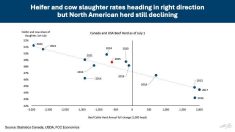Questions about what seed companies want aren’t new. Multinational firms have pushed for less regulation for years.
The issue came up at the Prairie Recommending Committee for Wheat, Rye and Triticale’s (PRCWRT) meeting back in February 2013, in Saskatoon.
“What is the one thing you think we should stop doing?” Stephen Fox, who at the time was a wheat breeder with AAFC in Winnipeg, asked Norm Dreger, then head of cereals for Syngenta in North America.
Read Also

VIDEO: Manitoba’s Past Lane – Jan. 31
Manitoba, 1946 — Post-war rations for both people and cows: The latest look back at over a century of the Manitoba Co-operator
“Well there’s views on the number of years (that data is collected), the number of sites, the number of locations,” Dreger, replied referring to data required from pre-registration wheat trials used by the PRCWRT to decide whether a new variety should be recommended for registration, and therefore commercialization. (The PRCWRT, made up of the wheat value chain, including farmers and experts on wheat agronomy, diseases and end-use quality, assesses new wheats and recommends if they should be registered. CFIA usually rubber-stamps the recommendation.)
Dreger said the United States has a “radically different” system — an allusion to the fact it doesn’t have a variety registration system.
“This is about making Canada competitive, it’s about making the farmer competitive, it’s about making Canada, the grain-trading nation, competitive,” Dreger said, portending arguments made nine years later during Seeds Canada’s recent seed summit meetings.
In 2013 Dreger didn’t come right out and say Canada’s registration system should be scrapped, nor was it suggested during Seeds Canada’s meetings.















